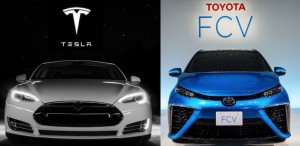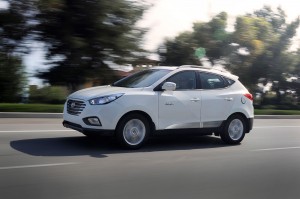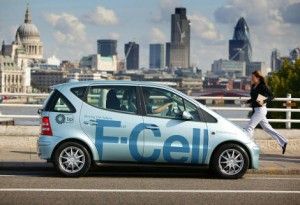Global Tucson Fuel Cell sales stood at just 273 units as of May, [Hyundai] said today, according to the Yonhap news service.
That includes 76 units delivered in 2013, 128 units in 2014, and 69 units for the first five months of this year.
Just 29 of the crossovers were sold in Hyundai’s home market of South Korea, with the rest going to the U.S. and Europe.
I’m open to the idea that hydrogen fuel cells could be a good fit for long-haul trucking (certainly battery electrics seem unlikely to work well in that capacity). But for the average car driver? Not so much. Battery electrics are much cheaper, easier, and environmentally friendly.
 In case you’re in the market for a super-expensive, environmentally beneficial vehicle, Teslarati does a convenient side-by-side comparison of the Model S with the Toyota Mirai. The cars actually come out pretty even, with one glaring exception: the ease of fueling.
In case you’re in the market for a super-expensive, environmentally beneficial vehicle, Teslarati does a convenient side-by-side comparison of the Model S with the Toyota Mirai. The cars actually come out pretty even, with one glaring exception: the ease of fueling.
In our view, one of the major benefits of BEVs [battery electric vehicles] is that you refuel them at home, overnight, while you’re sleeping, so that your Model S is “full” every morning. Unless you travel long distances on a regular basis, you will rarely need a Tesla Supercharger or any other refueling source away from home. That’s huge, and often get’s lost in the discussion of “range anxiety” that always seems to invade the thinking of those who don’t own a Model S. Although fuel cells are sexy, it seems odd to us that Toyota has returned to a 20th century fueling station paradigm. In essence, there is little difference between refueling a Mirai and refueling a Camry. Sure, the fuel is different, but you have to hunt for a specific refueling station as your Mirai slowly depletes its hydrogen. No charging at home—ever.
Not to mention that the hydrogen can be energy-intensive to generate and may not come from clean sources. As I’ve written before, there are big question marks about the long-term environmental benefits of investing in hydrogen fueling. It may be necessary for some big cargo trucks that can’t otherwise be powered efficiently by batteries, but we shouldn’t look to it as a panacea for passenger vehicles.
Either way, we’ll need the prices on both vehicles to come down significantly in order to make a dent in our transportation emissions.
California recently committed to spending $50 million on 28 public hydrogen fuel cell charging stations, throwing gasoline (bad pun) on the fire of a growing debate: electric vehicles vs, hydrogen fuel cells as the carbon-free vehicle technology of the future. California policy makers seem to think it may be both, based on their spending to support the two technologies.
But the evidence to date suggests that hydrogen fuel cells, which automakers like Toyota are committed to, may actually be “fool cells,” as Tesla CEO Elon Musk calls them derisively. Joe Romm, expert on alternative fuels from the US Department of Energy and author of a 2004 book on the debate, takes a strong position against hyrdogen fuel cells. His point? The fuel (hydrogen) will come from dirty sources for the foreseeable future, compared to clean, electric-powered battery vehicles:
Converting cheap fracked gas into hydrogen is very likely going to be substantially cheaper than practical, mass-produced carbon-free hydrogen for decades, certainly well past the point we need to start dramatically reducing transportation emissions (which is ASAP).
For EVs, on the other hand, unsubsidized renewable electricity is already directly competitive with grid electricity in many parts of the country — and poised to continue dropping in price. In places where carbon-free power is on the rise, such as California, the electricity is already far less carbon intense than the nation as a whole. That’s why EVs in a state like California is already super-green.
In terms of climate change impacts, Romm is clear:
So from a greenhouse gas perspective, there is no competition between pure electrics and hydrogen fuel-cell vehicles. EVs win hands down and will continue to do so for the foreseeable future.
I’m all in favor of fostering competition among promising clean vehicle technologies, but Romm’s critique points to the significant environmental disparity between these technologies, at least in the short term. In addition, there is a huge expense associated with developing an entirely new fuel infrastructure for hydrogen. EVs, by contrast, can access ubiquitous electricity throughout our developed areas. It’s also disappointing to see California commit to spending so much public money on a technology that consumers are not demanding, particularly given the ongoing need for investment in new EV charging stations in the state.
EVs certainly have a ways to go in terms of decreasing costs and increasing battery range. But automakers are making progress and consumers are responding. If companies like Toyota think hydrogen fuel cells are a better deal for California drivers and the environment, then let them spend their own money to prove it.




